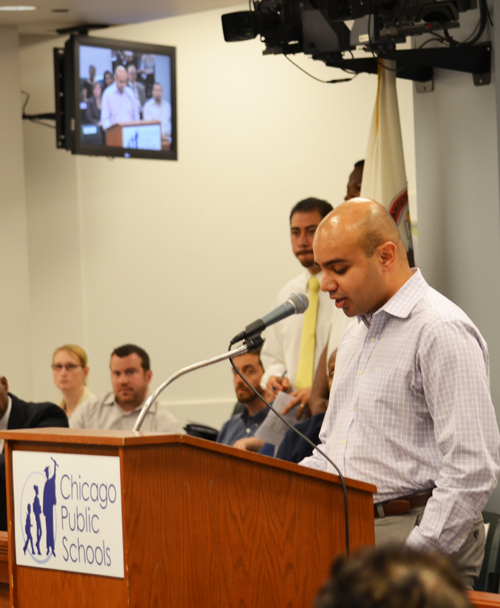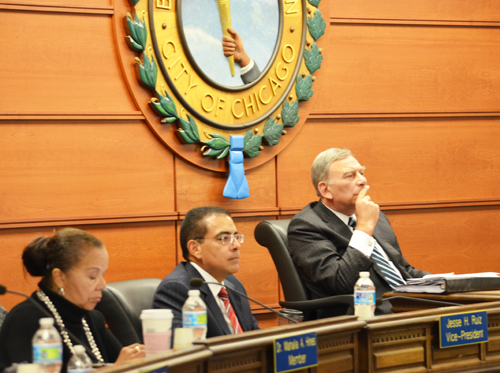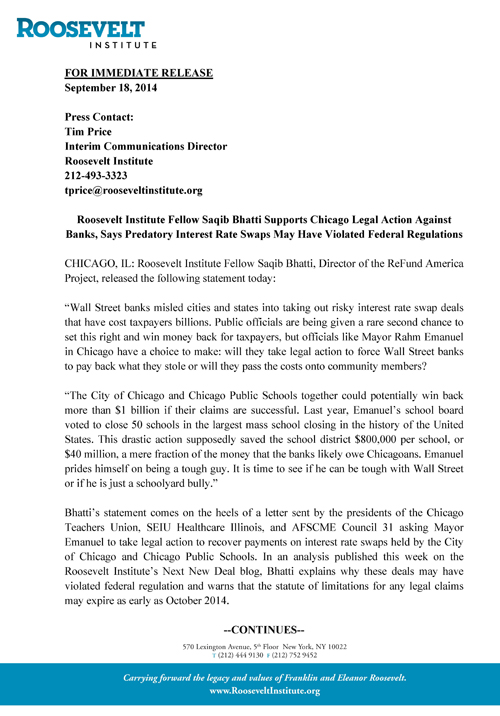'...CPS could file for arbitration to potentially get back this $440 million on the grounds that the banks did not deal fairly with the district...' Expert tells CPS that Chicago Public Schools should ask for arbitration on 'Toxic Swaps' ... Board members add more excuses for avoiding doing that
[Editor's Note: During the six years since Substance first reported the scandal involving the use of "interest rate swaps" by the Chicago Board of Education, little has been reported about the overall impact of the swaps on the CPS budget, let alone on what CPS might do to recoup the money lost. At the September 24, 2014 Board of Eduction meeting, two speakers, Saqib Bhatti and Jackson Potter, asked the Board to file for arbitration to discover whether the original dealings that led to the swaps were done in a legal manner. After Bhatti and Potter left the Board meeting, Board members discussed the latest revelations and made it clear that they are not going to arbitrate these issues, despite the fact that arbitration might recoup more than a quarter billion dollars for the nation's third largest school system. Following below here is the statement made to the September 24, 2014 Board meeting by Saqib Bhatti, who provided it in writing to Substance. George N. Schmidt, Editor, Substance].
 Saqib Bhatti of the Roosevelt Institute told the Board that it could file for arbitration on the "toxic swaps." If the arbitration were to show that the Board was misled by the banks when former CEO Arne Duncan and his staff entered into the swaps in the early years of the 21st Century, CPS might recoup as much as $400 million dollars, according to Bhatti's research. Substance photo by George N. Schmidt.My name is Saqib Bhatti. I am a proud CPS alum and the director of the ReFund America Project at the Roosevelt Institute, which is an economic policy think tank.
Saqib Bhatti of the Roosevelt Institute told the Board that it could file for arbitration on the "toxic swaps." If the arbitration were to show that the Board was misled by the banks when former CEO Arne Duncan and his staff entered into the swaps in the early years of the 21st Century, CPS might recoup as much as $400 million dollars, according to Bhatti's research. Substance photo by George N. Schmidt.My name is Saqib Bhatti. I am a proud CPS alum and the director of the ReFund America Project at the Roosevelt Institute, which is an economic policy think tank.
I am here today to talk about CPS�s interest rate swap deals.
Under a federal regulation called MSRB Rule G-17, the banks that pitched interest rate swap deals had an obligation to �deal fairly� with cities, states, and school districts.
This means that the banks had to make sure that public officials understood the risks that they were taking on, and that they could not misrepresent or downplay those risks.
This standard of fair dealing was typically not met in swap transactions, and we have strong reason to believe that most municipal swap deals that exist could have violated federal law. The standard pitch around swaps emphasized the potential benefits, but minimized the risk. In many cases, the projections of potential benefits were based on the ridiculous assumption that none of the risks would ever materialize.
Of course that is not what happened.
 Board of Education Vice President Jesse Ruiz (above center) and President David Vitale (right above) listened to Saqib Bhatti's testimony while other Board members, including Mahalia Hines (left) played with their personal digital assistants. Ruiz and Vitale then waited for the two presenters who discussed the so-called "toxic swaps" to leave the meeting before they spoke of their latest excuses for not investigating the deals with the largest banks that have already cost CPS a quarter million dollars and will cost a quarter million more if they are not terminated. Ruiz, a millionaire attorney, noted during the public discussion at the end of the meeting that the arbitration would take information from "both sides" and might not help the CPS budget. Vitale, as usual, delivered his standard talking points about how there are "facts" presented during the Board meetings and the "true facts" which are known only to the members of the Board. The indications are that the Board will not seek arbitration on the deals, partly because the Board continues to cover up for former CEO Arne Duncan, who did the deals when it was not legal for the Board to even do so. Substance photo by George N. Schmidt.When the banks crashed the financial system in 2008 and our broader economy along with it, the Federal Reserve was forced to slash interest rates to keep the economy on life support. At that time, many of these risks materialized.
Board of Education Vice President Jesse Ruiz (above center) and President David Vitale (right above) listened to Saqib Bhatti's testimony while other Board members, including Mahalia Hines (left) played with their personal digital assistants. Ruiz and Vitale then waited for the two presenters who discussed the so-called "toxic swaps" to leave the meeting before they spoke of their latest excuses for not investigating the deals with the largest banks that have already cost CPS a quarter million dollars and will cost a quarter million more if they are not terminated. Ruiz, a millionaire attorney, noted during the public discussion at the end of the meeting that the arbitration would take information from "both sides" and might not help the CPS budget. Vitale, as usual, delivered his standard talking points about how there are "facts" presented during the Board meetings and the "true facts" which are known only to the members of the Board. The indications are that the Board will not seek arbitration on the deals, partly because the Board continues to cover up for former CEO Arne Duncan, who did the deals when it was not legal for the Board to even do so. Substance photo by George N. Schmidt.When the banks crashed the financial system in 2008 and our broader economy along with it, the Federal Reserve was forced to slash interest rates to keep the economy on life support. At that time, many of these risks materialized.
The net payments on swaps skyrocketed.
CPS now pays $36 million a year on its swaps. Over the life of these deals, CPS has paid nearly $240 million to Wall Street.
Based the district�s own financial statements, CPS is still on the hook for another $200 million in future payments.
But there is something we can do about it. CPS could file for arbitration to potentially get back this $440 million on the grounds that the banks did not deal fairly with the district.
 The September 18 press release from the Roosevelt Institute indicated that Chicago could recoup as much as $1 billion -- of which more than $400 million could go to Chicago Public Schools -- if CPS were to go into arbitration on the "toxic swaps" that the Board of Education allowed former "Chief Executive Officer" Arne Duncan to enter into illegally a decade ago. The Board members at the Board's September 24, 2014 meeting once again indicated that they have no intention of trying to recoup the massive amount of money. Board President David Vitale once again repeated his talking point about the Board knowing what he calls the "true facts," while Board Vice President Jesse Ruiz, a millionaire lawyer, warned that CPS might not "win" if it tried arbitration on the swap deals. The Board members waited until the two speakers who had outlined the swap arbitration potential had left the Board meeting before they spoke on the subject.I urge you to move on this immediately, because the eligibility period for these claims with could run out as early as next month.
The September 18 press release from the Roosevelt Institute indicated that Chicago could recoup as much as $1 billion -- of which more than $400 million could go to Chicago Public Schools -- if CPS were to go into arbitration on the "toxic swaps" that the Board of Education allowed former "Chief Executive Officer" Arne Duncan to enter into illegally a decade ago. The Board members at the Board's September 24, 2014 meeting once again indicated that they have no intention of trying to recoup the massive amount of money. Board President David Vitale once again repeated his talking point about the Board knowing what he calls the "true facts," while Board Vice President Jesse Ruiz, a millionaire lawyer, warned that CPS might not "win" if it tried arbitration on the swap deals. The Board members waited until the two speakers who had outlined the swap arbitration potential had left the Board meeting before they spoke on the subject.I urge you to move on this immediately, because the eligibility period for these claims with could run out as early as next month.
To file a claim, you simply go to the website of the Financial Industry Regulatory Authority, or FINRA, and fill out an online form.
Thank you.


By: Jim Vail
Can't be polite
I'm sure Vitale and the board were laughing inside hearing these pleas to arbitrate toxic rate swaps. This is how the system works. Corporate banks work with govern. officials to screw the people. If the union was serious about this, they would push for all its members to boycott Chase and JP Morgan, who set up these toxic swaps all over the country to screw municipalities (read The Rolling Stone story on JP Morgan and Jefferson County - http://www.rollingstone.com/politics/news/jefferson-county-alabama-screwed-by-wall-street-still-paying-20110407).
That would mean encouraging its 29,000 CTU members to put there hard earned deposits elsewhere, such as the credit union that works with the union. Begging the board to do the right thing is just silly.